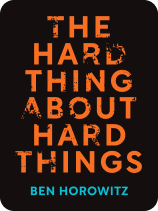

This article is an excerpt from the Shortform book guide to "The Hard Thing About Hard Things" by Ben Horowitz. Shortform has the world's best summaries and analyses of books you should be reading.
Like this article? Sign up for a free trial here .
How do you know when it’s the right time to sell your business? Is it in your best interest to stay independent?
In The Hard Thing About Hard Things, author Ben Horwitz discusses when the right time to sell your business is. There are both rational and emotional factors when it comes to selling something you’ve built and both play into the decision-making process.
Continue reading for advice on whether or not you should sell your business.
Should You Sell Your Business?
At points in the company’s lifetime, you might get buyers who propose buying your company. On the one hand, it can mean more financial stability than you ever thought possible. On the other, it can mean letting go of the vision that compelled you to start the company in the first place and betraying a team that is still excited to chase that vision.
Necessarily, the decision to sell your business is part rational and part emotional.
The Rational Side
On the rational side, answer two questions about your company:
- Is the opportunity still growing? Is the market bigger than anyone realizes?
- Do you have a chance at being number one in the market? How hard will achieving this be?
If you answer “yes” to both, then you should stay independent. The reason is that you will estimate a lofty valuation for your company that likely no one will be able to meet, because your project relies on too many unknowns.
- For example, early in its life, Google received acquisition offers for $1 billion. While an astronomical amount for any company, it grossly underestimated the ultimate value of the company (now 1000 times larger, at $1 trillion). The market Google now commands turned out to be far larger than the markets that potential buyers like Yahoo owned at the time.
These aren’t easy questions to answer. You may think the market is larger than it really will be. You may think you’re in one huge market, but in reality you service just a small market.
Your answers to these questions will change over time. Ben Horowitz’s perspective on selling Opsware changed from beginning to end:
- When they first received acquisition offers, Opsware had just 50 customers. But Ben thought there would be at least 10,000 target customers, and they had a good shot at being market leader. If they took 30% of the market, their valuation would suggest 60 times forward revenue to buy. No one took the offer.
- Near the end of Opsware, the market had grown significantly, but competition was fiercer. Developments in virtualization technology also meant they needed to overhaul parts of their product, and he felt the team was tired. He decided it was time to sell for the right price.
The Emotional Side
There are emotional pieces to selling your business, from the commitment you made to the team to the personal commitments you make to your family. Ben Horowitz suggests advice for two major pieces: your personal finances and your communication with the team.
For personal finances, pay yourself a reasonable salary when the business might start attracting buyers. During the startup phase, investors usually encourage paying the founders as little salary as possible to best incentivize growing a valuable company. However, when a business might be acquired, the attitude should shift—the CEO should be paid sufficient salary so she isn’t tempted to sell purely to make her bill payments.
For team communication, be transparent about your decision process for acquisitions. State that while your company has a chance to be number one in a large and growing market, then the company will stay independent. If not, it might be sold. When framed this way, the company owners and the staff are fairly well aligned. This transparency is better than dodging questions about acquisitions; your employees will take your vague answers however they like and start rumors.

———End of Preview———
Like what you just read? Read the rest of the world's best book summary and analysis of Ben Horowitz's "The Hard Thing About Hard Things" at Shortform .
Here's what you'll find in our full The Hard Thing About Hard Things summary :
- What it was like to head a company through the dotcom bubble and subsequent burst
- Why failing is normal
- How to build a good place to work






